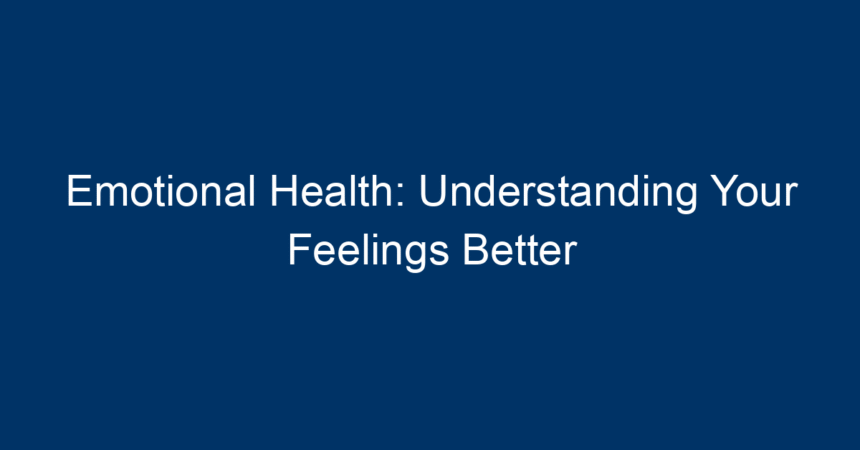Introduction
In today’s fast-paced world, emotional health is a cornerstone of overall wellbeing. It encompasses our ability to recognize, understand, and manage our emotions positively. Understanding your feelings better is essential not only for personal growth but also for fostering healthier relationships and improving mental resilience. This article delves into the intricacies of emotional health, offering insights into its importance, how to recognize your emotions, and practical strategies for enhancement.
What is Emotional Health?
Emotional health refers to the complex interplay between our thoughts, feelings, and actions. It is often defined as the ability to manage emotions, cope with stress, and communicate effectively. Emotional health is more than just the absence of mental illness; it’s about being in tune with your emotional state, having self-awareness, and possessing the skills needed to navigate life’s challenges.
The Importance of Emotional Health
Understanding and nurturing your emotional health is vital for multiple reasons:
- Improved Relationships: Recognizing your emotions helps you communicate more effectively with others, leading to healthier relationships.
- Enhanced Coping Mechanisms: When you are aware of your feelings, you can adopt healthier strategies to deal with stress and adversity.
- Mental Clarity: A solid emotional foundation enhances cognitive function, making it easier to make decisions and solve problems.
- Better Physical Health: Emotional health can influence physical health by impacting immune response, cardiovascular health, and overall resilience.
Recognizing Your Emotions
To enhance your emotional health, it is crucial to start by recognizing your feelings. Emotional self-awareness is the foundation on which you can build healthier responses.
Common Emotions and Their Signals
-
Happiness: Often recognized through physical manifestations like smiling, laughter, and a sense of light-heartedness. It may indicate satisfaction or contentment.
-
Sadness: Frequently accompanied by crying, low energy levels, or withdrawal from social situations. Such feelings may arise from loss or disappointment.
-
Anger: Signals like tightness in the chest, shouting, or uneasiness often accompany this emotion. It’s essential to recognize anger as a signal that something needs to change.
-
Fear: This emotion may manifest as a racing heart, sweaty palms, or avoidance behaviors. Acknowledging fear can lead to greater safety and preparedness.
- Anxiety: Symptoms may include restlessness, a racing mind, or physical tension. Recognizing anxiety can help you find appropriate coping strategies.
Tools for Emotional Recognition
- Journaling: Writing about your emotions can help clarify feelings and identify patterns.
- Mindfulness and Meditation: Techniques that encourage present-moment awareness can improve your understanding of emotional states.
- Therapy: Professional guidance can provide you with tools and techniques to better grasp and articulate your emotions.
Strategies to Enhance Emotional Health
Improving your emotional health requires consistent effort and a willingness to interact with your feelings. Below are practical strategies to cultivate emotional wellbeing.
1. Practice Mindfulness
Incorporating mindfulness practices can significantly enhance emotional health. Mindfulness allows you to be present with your emotions without judgment.
- Mindfulness Meditation: Regular meditation can help you observe your thoughts and feelings, allowing for deeper understanding and non-reactive awareness.
- Breath Awareness: Focusing on your breath can anchor you in the present moment, making it easier to manage overwhelming emotions.
2. Build Emotional Intelligence
Emotional intelligence (EI) is the ability to understand and manage your emotions and those of others. Building EI can significantly enhance your emotional health.
- Self-awareness: Regularly assess your emotional responses to various situations.
- Self-regulation: Develop coping mechanisms to respond to challenging emotions, such as taking timeouts or seeking support.
3. Foster Healthy Relationships
Relationships play a pivotal role in emotional health. Building connections with others can provide support and understanding.
- Communicate Openly: Sharing your feelings with trusted friends or family members can alleviate emotional burdens.
- Seek Support: Don’t hesitate to reach out for professional support when needed.
4. Engage in Physical Activity
Physical health closely ties to emotional wellbeing. Regular exercise can release endorphins, improve mood, and reduce anxiety.
- Start Small: Incorporate daily walks, dance, or yoga into your routine to release pent-up emotions and reduce stress.
5. Establish Healthy Routines
Creating a balanced routine can contribute positively to emotional health.
- Sleep Hygiene: Ensure adequate and quality sleep, as lack of sleep can negatively impact your mood and emotional resilience.
- Nutrition: A balanced diet supports brain health, which can improve emotional regulation.
The Role of Self-Reflection
Self-reflection is a powerful tool for enhancing emotional health. Taking time to contemplate your feelings can yield valuable insights.
Journaling Techniques
- Daily Reflections: Spend a few minutes each day writing about your emotional experiences.
- Gratitude Journaling: Focus on the positive aspects of your day, enhancing your overall emotional outlook.
Asking Reflective Questions
Consider what triggers certain emotions in your life and how you can respond differently. Journaling prompts might include:
- What emotions did I experience today, and what triggered them?
- How did I respond to my emotions, and what could I do differently?
- What coping strategies worked for me today, and which did not?
Conclusion: Take Action!
Understanding your emotional health is a continual journey that requires practice and reflection. By recognizing your feelings and developing effective coping strategies, you can foster resilience, improve relationships, and enhance your overall wellbeing.
Actionable Insights
- Begin a Journaling Practice: Dedicate 10 minutes daily to document your feelings and reflect on your emotional responses.
- Set Aside Time for Mindfulness: Commit to a short daily mindfulness practice to cultivate awareness of your emotions.
- Reach Out for Support: Identify someone in your life who you can talk to about your feelings and nurture that relationship.
Embrace the path of emotional health, and take actionable steps towards understanding and managing your emotions more effectively. Your emotional landscape is an ever-evolving canvas; with intent and practice, you can paint a brighter, healthier picture of your emotional world.




